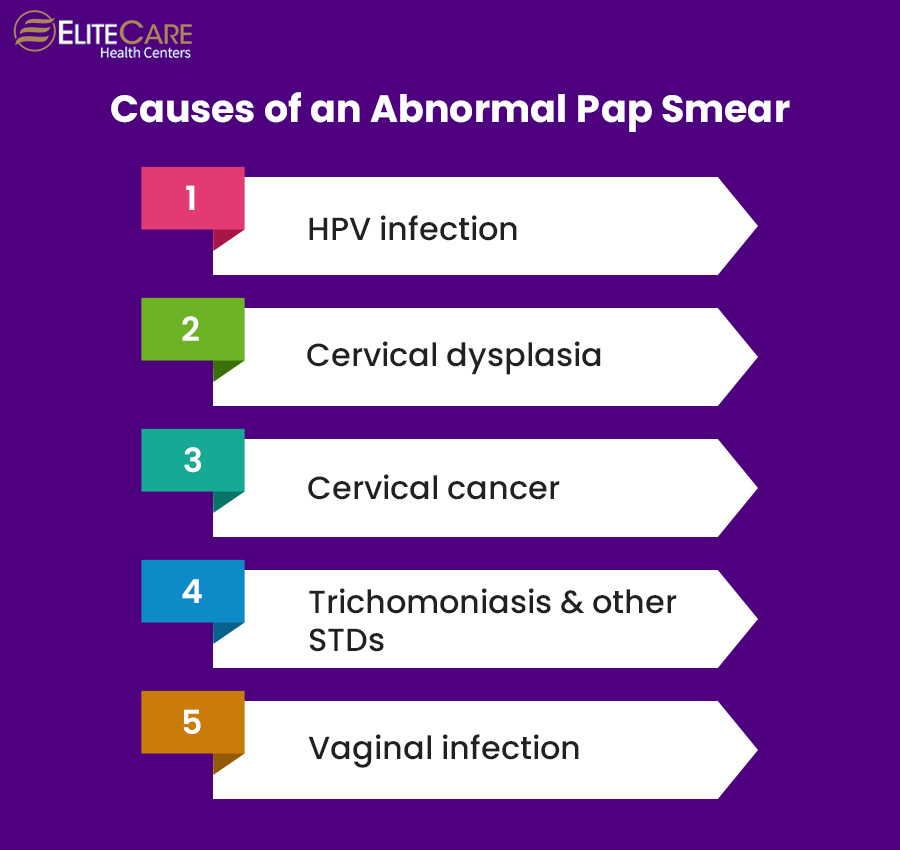
Do you know doctors recommend a Pap smear (also known as Pap test) for all women aged between 21 and 65? A Pap smear can also be part of a pelvic exam. It is a screening procedure to detect abnormal cells on the cervix, the lower end of the uterus, that opens into the vagina. The test is performed by a healthcare provider, who uses a small brush or spatula to collect a sample of cells from the cervix. The cells are then analyzed under a microscope to check for abnormal changes. It is the only method available to check the cells on your cervix and to locate possible changes that can lead to cancer.
Abnormal cells may appear due to infection, inflammation, or other changes that can increase cancer risk. Further testing may be needed to confirm the diagnosis if abnormal cells are found.
Several different terms are used to describe abnormal Pap smear test results, depending on the specific changes seen in the cells. Some of the most common abnormal Pap smear results include:
- Atypical squamous cells (ASC): This means that the cells from the cervix appear abnormal, but it’s unclear whether the changes are precancerous. This can be caused by infection, inflammation, or other noncancerous conditions.
- Low-grade squamous intraepithelial lesion (LSIL): This is a pre-cancerous condition that looks slightly abnormal under a microscope. It is usually caused by infection with the human papillomavirus (HPV). Treatment may be required depending on the severity of the condition.
- High-grade squamous intraepithelial lesion (HSIL): It is an abnormal growth of squamous cells in the lining of the cervix.
- Carcinoma in situ (CIS): It is an early form of cancer confined to the layer of cells in which it originated and has not spread to other tissues. It is considered a precancerous condition, potentially becoming a more serious form of cancer if left untreated.
- Cervical cancer: In this condition, the cells from the cervix show malignant changes, and cervical cancer is present.
Read More: List of Common Health Problems in Elderly
Abnormal Pap smear causes:

After finding an abnormal result, your doctor will explain what the Pap smear indicates and any further testing or treatment you may need. The several causes of an abnormal Pap smear include the following:
HPV infection
Human papillomavirus (HPV) is a virus. It is the most common sexually transmitted infection (STI). Generally, HPV doesn’t show any signs or symptoms. In many cases, HPV will clear up without treatment and not lead to other health issues. However, in some cases, it can lead to cervical and other types of cancer.
Human papillomavirus (HPV) is a group of viruses that cause human infections. There are more than 200 different types of HPV, and about 40 can infect the genitals.
Cervical dysplasia
It is a precancerous condition that occurs when abnormal cells start to grow on the surface of the cervix. That affects the cells on the surface of the cervix, the opening at the lower end of the uterus. Certain types of HPV infection can cause it. Cervical dysplasia is most common in women in their twenties and thirties and can lead to cervical cancer if left untreated.
Cervical Cancer
As mentioned earlier, cervical cancer is a type of cancer affecting the cervix’s cells. It can be caused by HPV infection, cervical dysplasia, or other factors.
Trichomoniasis and other STDs
Trichomoniasis is a type of STD caused by a parasite called Trichomonas vaginalis. It can cause abnormal Pap smear results, as can other STDs such as chlamydia and gonorrhea.
Vaginal infection
Vaginal infections, such as yeast and bacterial vaginosis, can cause inflammation and abnormal cells to appear on a Pap smear.
Harmless Abnormal Pap smear causes
Sometimes, an abnormal Pap smear result may be caused by benign changes in the cervix, such as inflammation, irritation, or healing from a prior infection. In such cases, follow-up testing may be needed to confirm the diagnosis and rule out any serious conditions.
It’s important to note that the causes for an abnormal Pap smear can be a combination of these and other factors. Some lifestyle factors, such as smoking or having multiple sexual partners, can also increase a woman’s risk of developing cervical cancer or precancerous changes.
Diagnosis
When an abnormal Pap smear is detected, a woman will typically be referred for additional testing to confirm the diagnosis and determine the appropriate course of treatment. Some of the tests that may be used include the following:
- Colposcopy: This is a procedure in which a doctor uses a special microscope, called a colposcope, to examine the cervix, vagina, and vulva in more detail. It allows the doctor to identify any abnormal areas and to take a biopsy of any suspicious-looking tissue.
- HPV testing: This test checks for the presence of human papillomavirus (HPV). If HPV is found, it may indicate that the abnormal cells found on the Pap smear are more likely to be precancerous or cancerous.
- Other imaging tests: In some cases, the healthcare provider may order additional imaging tests, such as an MRI or CT scan, to further evaluate the cervix and surrounding structures. These tests can help determine if there are any abnormal growths or tumors causing the abnormal Pap smear results.
Treatment and Management for an Abnormal Pap Smear

The treatment and management for an abnormal Pap smear will depend on the cause and severity of the abnormality. In general, the steps may include the following:
- Follow-up testing: If an abnormal Pap smear is identified, the healthcare provider will typically order follow-up testing to determine the cause and extent of the abnormality. This may include additional Pap smears, colposcopies, or biopsies.
- Cervical cancer screening: Women with an abnormal Pap smear will typically be recommended for cervical cancer screening, which may include additional Pap smears, HPV testing, or a colposcopy. This will help determine if cervical cancer is present and if further treatment is required.
- Treatment for HPV: If the abnormal Pap smear is caused by HPV, the healthcare provider may recommend treatment to reduce the risk of cervical cancer. HPV vaccines are given to prevent HPV infections, and antiviral medications can be given to suppress the HPV virus.
- Cryotherapy: Cryotherapy is a procedure in which abnormal cells are frozen off the cervix. This is typically used for mild to moderate abnormalities and is considered a minor procedure.
- Laser surgery: Laser surgery is a procedure in which a laser removes abnormal cells from the cervix. This procedure may be used for moderate to severe abnormalities and is typically performed in an outpatient setting.
- Cone biopsy: A cone biopsy is a procedure in which a cone-shaped piece of tissue is removed from the cervix for examination. This procedure may be used to determine if cervical cancer is present or to remove a cervical lesion.
Prevention

Preventing abnormal Pap smears can be achieved through several methods:
- Getting vaccinated against HPV can significantly reduce the risk of developing cervical cancer and other types of HPV-related diseases. The HPV vaccine is recommended for boys and girls at 11 or 12 years old, but it can also be given to adults who may be up to 45 years old.
- Practicing safe sex, using condoms, and limiting the number of sexual partners can help to reduce the risk of HPV infection.
- Having regular Pap smears can help to detect abnormal cells early before they have a chance to develop into cervical cancer. The screening schedule may vary depending on age, medical history, and other factors.
- Quitting smoking can improve overall health and decrease the risk of cervical cancer.
- Eating a diet rich in fruits and vegetables, and maintaining a healthy weight, also improves overall health and decreases the risk of cervical cancer.
- Starting sexual activity at a young age, having multiple partners, or having partners who have multiple partners, increases the risk of HPV infection.
Read More: Foods That Help Lower Blood Pressure
Takeaway
It’s important to note that not all abnormal Pap smears require treatment, and some may require monitoring over time. The healthcare provider will create a personalized treatment plan based on the patient’s case, considering the results of follow-up testing, cervical cancer screening, and medical history. Additionally, it’s crucial to have regular Pap smear tests to monitor the cervix’s health and detect any abnormal changes early.
Schedule an appointment at EliteCare Health Centers to ensure that cervical health is being monitored and to address any concerns.






